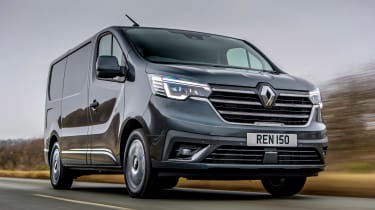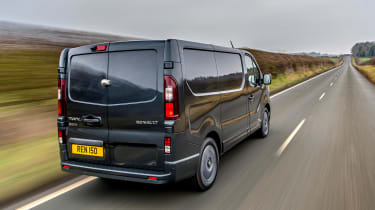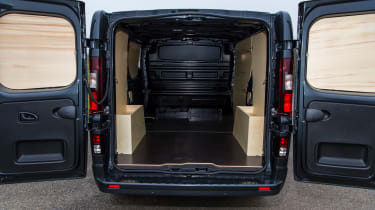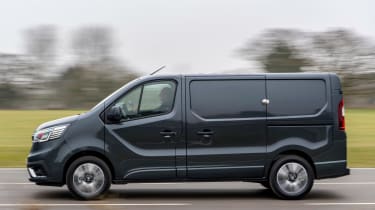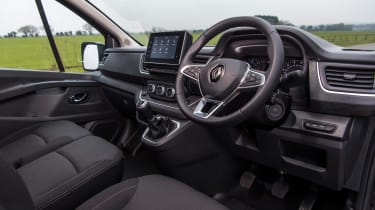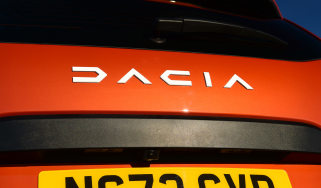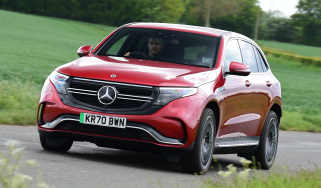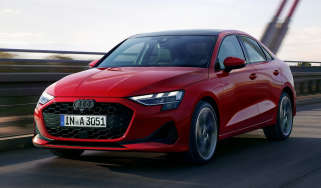Renault Trafic van review
Renault’s Trafic remains a top mid-size panel van offering with economical engines and some clever touches in the cabin
The current Renault Trafic has been around for a while now, but it's still a popular choice, ranking alongside the Clio and Captur as one of the firm's best-selling models. This generation of Trafic was first launched in 2014, but constant revisions and updates have kept it near the front of the medium-sized van pack. The latest updates introduce a fresh new look inside and out, but have kept the van's practical side intact.
Up front, the Trafic has a completely redesigned front end, with a squarer look than before, while C-shaped daytime running lights come as standard on all models. There's chrome trim for higher-spec models and alloy wheels, too. Inside, the cab now features switchgear carried over from the Renault car range, with climate controls, touchscreen infotainment and a part-digital instrument cluster similar to that found in the Clio.
One area that remains unchanged is the Trafic's cargo bay. The dimensions here are the same as before, so it's still one of the best-shaped cargo areas on offer in the medium-sized van class, and there's up to 8.6 cubic metres of space, depending on which size van you go for. Business, Business+ and Sport trims have been joined by a new Sport+ specification, which introduces even more kit to the van, including lane departure warning and traffic sign recognition.
More reviews
All models benefit from a DAB radio with Bluetooth, ESC stability control, a full steel bulkhead, remote central locking, a sliding side door and electronic stability control and speed limiter. Business+ adds an eight-inch touchscreen with Apple CarPlay and Android Auto connectivity, plus manual air-conditioning, rear parking sensors, a through-loading bulkhead and Renault's Mobile Office, which comprises a fold-down table on the back of the middle passenger seat that has space underneath to store a laptop).
Sport models add alloy wheels, body coloured bumpers, electrically folding mirrors, touchscreen sat-nav and a TFT driver's display, plus LED interior lighting, auto lights and wipers, a driver alert system and automatic emergency braking. On Sport+, not only is there lane departure warning and road sign recognition, but also metallic paint as standard, keyless entry, climate control and a rear parking camera.
Four engines are offered, all based on the same 2.0-litre BluedCi diesel that was introduced in 2019. There is a new dCi 110 version and a dCi 130 which replaces the old dCi 120, while more powerful dCi 150 and dCi 170 versions are also offered. All of these come with stop-start, with the dCi 110 and 130 having the six-speed manual gearbox only, while the dCi 150 and dCi 170 have a six-speed EDC auto option available. The dCi 170 is only offered in higher Sport and Sport+ trims.
The Renault Trafic's chief rival is the Ford Transit Custom, the UK's best-selling van. But there's more to the medium-sized van class than just the Transit Custom, since the Volkswagen Transporter and Mercedes Vito are also strong challengers. Elsewhere, the Vauxhall Vivaro, Citroen Dispatch, Peugeot Expert and Toyota Proace are badge-engineered versions of the same vans, but are more car-like than the other models mentioned here. Closer to home, the Renault Trafic is also sold as the Nissan Primastar (the Nissan having now swapped back to that name from NV300 previously used).
Considering Renault's push into electrification, it's a surprise that the Trafic has yet to be offered as an electric van. However, an electric version is expected later in 2022, so that it can compete with rivals, and complete the firm's electric van line-up alongside the Master and Kangoo E-Techs.
MPG, CO2 and running costs
Changes to the Renault Trafic engine line-up haven't come at the expense of fuel efficiency. In fact, the new units are more economical than the ones they're replacing. The dCi 110, dCi 130 and dCi 150 all have official WLTP figures of up to 40.9mpg, where the outgoing dCi 120 managed a best of 39.8mpg. The dCi 170 is only slightly behind at 40.4mpg, while adding an auto gearbox to either the 150 or 170 engines means maximum economy of up to 39.8mpg.
Stop-start is standard to help improve fuel economy, while Renault's 'ECO' mode button is carried over. However, this tends to blunt the van's performance, so any energy saving it might offer is likely to be offset by the extra time that's needed to get the van up to speed in the first place.
All Trafic vans come with an 80-litre fuel tank, so theoretically you should be able to do more than 600 miles between fills. AdBlue is used to clean up the van's emissions, and there's a 25-litre tank that will need to be filled every few thousand miles - the van's trip computer will let you know when to do so.
Other highlights of Renault Trafic ownership are the fact it comes with a three-year/100,000-mile warranty (as well as three years of breakdown cover), while service intervals are every two years or 24,000 miles, whichever comes first. Renault's PRO+ network of commercial vehicle dealers is also available to help keep downtime with your van as short as possible.
Load space and practicality
The Renault Trafic is one of the most spacious mid-sized vans on the market, and this remains unchanged with the 2022 model year updates, which focus largely on efficiency, cabin quality and a new front-end design.
An overall length of 5,080mm for the standard L1 Trafic (and 5,480mm for the L2 model) means it's one of the longer vans on the market, and the standard panel van has 5.2 cubic metres of cargo volume in the back. Crucially, this enables the smallest Trafic to carry three Europallets or 11 standard sheets of plasterboard.
Moreover, Renault includes a special 'load through bulkhead' on Business+ models and above. This is basically two flaps, one at floor level in the bulkhead behind the passenger seat and a second under the passenger seat itself. Open the first and planks or piping of up to 2.94m in length can be accommodated. Open the second and you've got 3.75m to play with. Again, that's in the short-wheelbase model. In the long wheelbase Trafic with the load through bulkhead, the maximum load length is a class-leading 4.15m. To help tie down loose items, there are 16 anchorage points found around the standard Trafic's cargo area, while the long-wheelbase van has 18 anchors.
Renault also fits a clever catch for the asymmetrically-split rear doors. This allows the left hand door that carries the Trafic's rear numberplate to be locked in place so very long items can be poked out of the right hand door and carried with rear lights and numberplate still visible. An internal ceiling rack is also available as an option, along with Renault's Ready4Work range of fully warrantied internal racking and storage solutions.
As well as the panel vans in two wheelbases and two roof heights, Renault offers a six-seater crew van, a nine-seater minibus and a platform cab ready to take a host of conversions. There's also the luxury seven-seat Trafic Space Class MPV, which takes on the Volkswagen T7 Multivan and Mercedes V-Class.
Reliability and safety
The Renault Trafic has a solid safety specification as standard, but you need to upgrade to a higher spec or add expensive option packs if you want the safest van possible. All vans get a full steel bulkhead between the cab and cargo area, a driver's airbag, ABS with EBD and ESC stability control with hill start assist and Grip Xtend to help out on slippery surfaces. Extra airbags are cost options, or you can move up to a higher spec for more useful kit.
The Business+ model adds the 'Wide View Mirror', which is a giant vanity mirror on the passenger sun visor. All Renault Trafics come with single mirrors that are curved to create a wide-angle view towards the edge of the glass, but the visor mirror helps to eliminate the Trafic's nearside blind spot by increasing the driver's field of vision. The only problem is that any passenger is left staring at their reflection for the duration of the trip. On the security front, all models get deadlocks, an immobiliser and an alarm, while Renault offers a number of deadlocks and security add-ons as part of the Trafic's range of accessories.
At the top of the range (and available in the Advanced Driver Assist Pack on lower-spec Trafics), lane keep assist is fitted to the Sport+ model. This is an audible and visual warning that you're staying from your lane, accompanied by a light-up warning in the dashboard and a bassy rumble through the speakers, similar to the sound you'd hear if crossing a white line at the edge of the motorway. It's not too intrusive, and it can be turned off if necessary.
Driving and performance
Renault replaced the Trafic's earlier 1.6 twin-turbodiesel engine with a larger 2.0-litre single turbo unit in 2019, and not only did this help improve the van's economy in the WLTP tests, but it means the Trafic is more responsive in everyday driving. The most powerful dCi 170 has 380Nm of torque at low revs, so it pulls sweetly from 1,500rpm. Even the lowest-powered dCi 110 packs a surprising amount of punch, courtesy of its 300Nm torque figure.
On the road, the Trafic is largely the same as before, with a commanding view of the road, a comfortable driving position and good rearward visibility. The 2.0 dCi makes life easy because its so quiet, while the six-speed gearbox has a decent shift action. The suspension of course is geared towards load carrying over comfort, but it doesn't feel too bouncy when unladen, and the Trafic is pretty smooth on longer runs.
That high driving position helps in town, while wide-angle mirrors - including the additional wide-view mirror in the passenger-side sun visor - help you to manoeuvre. A rear camera, front and rear parking sensors, lane departure and city braking are all available, too.
Renault's EDC six-speed auto really takes the strain out of driving in town. We haven't tried it in the revised model, but past experience reveals that it shifts smoothly, although it's a bit slow to react when you accelerate, and it does seem keen to kick down whenever you use the throttle, which can send the revs soaring. There's a manual mode (but no paddle shifters) which is effective at holding gears when you're negotiating a steep downhill slope.
Cab and interior
Renault has gradually updated the Trafic, and it’s now more like a passenger car than ever. The dashboard has been revised once again with a bit more brushed silver trim and an uncluttered layout, while the climate controls and eight-inch infotainment touchscreen will look familiar to anybody who has driven a current Clio or Captur.
The multifunction steering wheel is a carry-over, too, as is the stubby audio control system set down to the right of the steering column. This comes in handy, because when Apple CarPlay is in use, the touchscreen is completely taken over, and with no physical volume controls, the buttons on the steering column are the only way to adjust the volume. We also found the smartphone display didn't fit proportionally within the eight-inch screen, and was squeezed vertically a little.
As before, there's up to 90 litres of storage space inside the cab, depending on which of the 14 possible storage spaces are present. The highlight from a user-friendliness point of view is Renault's Mobile Office which is found on Business+ models and above. It's a middle front passenger seat with a fold-down back that reveals a table with detachable clipboard and a laptop storage space. It doesn't seem to be quite on a par with the rest of the cabin in terms of robustness, but it will definitely be a useful addition for those with paperwork to do on the move.
The Trafic range now features Renault's Easy Link eight-inch infotainment system on Business+ models and above. This allows you to hook up a smartphone and use either Android Auto or Apple CarPlay, while Sport and Sport+ models include TomTom sat nav as well. These versions also get a 4.2-inch TFT colour trip computer display between the dials.
Whichever model you choose, Bluetooth is standard on all vans, so connectivity shouldn't be an issue. USB and 12-volt charging sockets also feature, and you can add 12-volt charging to the cargo area, too.
| Van dimensions | ||
| Body style | Height | Width |
| SWB Low roof | 1,971mm | 1,956mm |
| SWB High roof | 2,465mm | 1,956mm |
| LWB Low roof | 1,967mm | 1,956mm |
| LWB High roof | 2,498mm | 1,956mm |
| Width including door mirrors | 2,283mm |
| Load area dimensions | ||||
| Body style Height Width Length Volume | Height | Width | Length | Volume |
| SWB Low roof 1,387mm 1,662mm 2,537mm 5.8m3 | 1,387mm | 1,662mm | 2,537mm | 5.8m3 |
| SWB High roof 1,898mm 1,662mm 2,537mm 7.8m3 | 1,898mm | 1,662mm | 2,537mm | 7.8m3 |
| LWB Low roof 1,387mm 1,662mm 2,937mm 6.7m3 | 1,387mm | 1,662mm | 2,937mm | 6.7m3 |
| LWB High roof 1,898mm 1,662mm 2,937mm 8.9m3 | 1,898mm | 1,662mm | 2,937mm | 8.9m3 |
